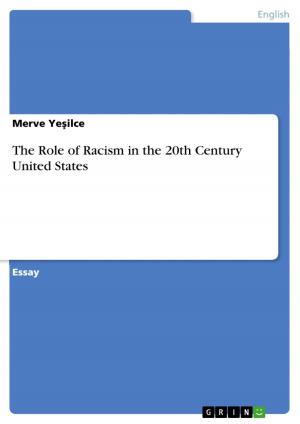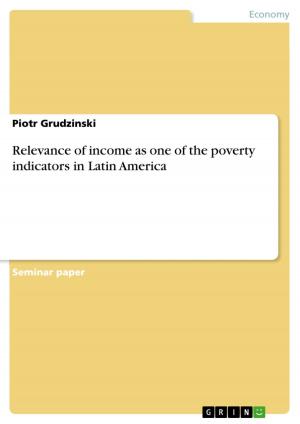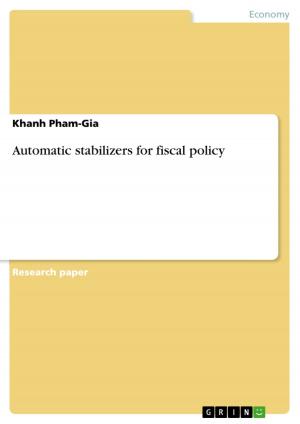Immigration and the welfare state - A comparative perspective of asylum and highly-skilled migration in Britain and Germany
A comparative perspective of asylum and highly-skilled migration in Britain and Germany
Nonfiction, Social & Cultural Studies, Political Science| Author: | Susanne Taron | ISBN: | 9783638573696 |
| Publisher: | GRIN Publishing | Publication: | November 26, 2006 |
| Imprint: | GRIN Publishing | Language: | English |
| Author: | Susanne Taron |
| ISBN: | 9783638573696 |
| Publisher: | GRIN Publishing |
| Publication: | November 26, 2006 |
| Imprint: | GRIN Publishing |
| Language: | English |
Seminar paper from the year 2006 in the subject Politics - International Politics - Region: Western Europe, grade: 1,0, University of Münster (Politikwissenschaft - European Studies), course: European Social Policies, 24 entries in the bibliography, language: English, abstract: Armed conflict, economic despair, and systematic violations of human rights have produced unprecedented challenges to today's international system. It is thus; the post-Cold War era has become witness to significant alterations in global politics that has subsequently generated acute increases in the number of worldwide migrants. Consequently, it is the relationship staggered between immigration and welfare that continues to become an increasingly salient European affair. Immigration continues to remain a contentious issue spawning vigorous debates intensely focused on welfare and social rights. Areimmigrants likely to make positive contributions to welfare states? Or are immigrants rather liable to be a threat, posingfinancial, social and political burdens, and an overall risk to the survival of these welfare states? Underpinning these ubiquitousquestions has been a realignment of debates about the needs and resources of European welfare states, with the renewed interest in immigration as a means of offsetting skills and labour market shortages, while countering the effects of a demographicallyaging European population.1Immigration additionally has beenviewed as a means in achieving the European Union's ambitious Lisbon targets, in that Europe 'would become the most competitive and dynamic knowledge-based economy in the world, capable of sustainable economic growth with more and better jobs and greater social cohesion'.2Yet as with most social issues, the simple term 'immigration' fails to do justice to the wide range of issues that this policy area entails. In fact, there is much to be said about the composition of immigrants, and it would be a huge oversight to classify immigration as though it were homogenous. An acute distinction must be drawn between 'desired' and 'undesired' forms of immigration, in the ways in which debates about needs and resources have been recast in Europe. Indeed, it seems that through this differentiation, European welfare states have pursued a janus-headed approach to immigration, in that European welfare states continue to open their doors, to highly-skilled immigrants, deemed as positive, but on the otherhand have continued to vigorously close their doors, particularly to asylum immigrants, which have become increasingly unwanted and the source of restrictive polices.
Seminar paper from the year 2006 in the subject Politics - International Politics - Region: Western Europe, grade: 1,0, University of Münster (Politikwissenschaft - European Studies), course: European Social Policies, 24 entries in the bibliography, language: English, abstract: Armed conflict, economic despair, and systematic violations of human rights have produced unprecedented challenges to today's international system. It is thus; the post-Cold War era has become witness to significant alterations in global politics that has subsequently generated acute increases in the number of worldwide migrants. Consequently, it is the relationship staggered between immigration and welfare that continues to become an increasingly salient European affair. Immigration continues to remain a contentious issue spawning vigorous debates intensely focused on welfare and social rights. Areimmigrants likely to make positive contributions to welfare states? Or are immigrants rather liable to be a threat, posingfinancial, social and political burdens, and an overall risk to the survival of these welfare states? Underpinning these ubiquitousquestions has been a realignment of debates about the needs and resources of European welfare states, with the renewed interest in immigration as a means of offsetting skills and labour market shortages, while countering the effects of a demographicallyaging European population.1Immigration additionally has beenviewed as a means in achieving the European Union's ambitious Lisbon targets, in that Europe 'would become the most competitive and dynamic knowledge-based economy in the world, capable of sustainable economic growth with more and better jobs and greater social cohesion'.2Yet as with most social issues, the simple term 'immigration' fails to do justice to the wide range of issues that this policy area entails. In fact, there is much to be said about the composition of immigrants, and it would be a huge oversight to classify immigration as though it were homogenous. An acute distinction must be drawn between 'desired' and 'undesired' forms of immigration, in the ways in which debates about needs and resources have been recast in Europe. Indeed, it seems that through this differentiation, European welfare states have pursued a janus-headed approach to immigration, in that European welfare states continue to open their doors, to highly-skilled immigrants, deemed as positive, but on the otherhand have continued to vigorously close their doors, particularly to asylum immigrants, which have become increasingly unwanted and the source of restrictive polices.















